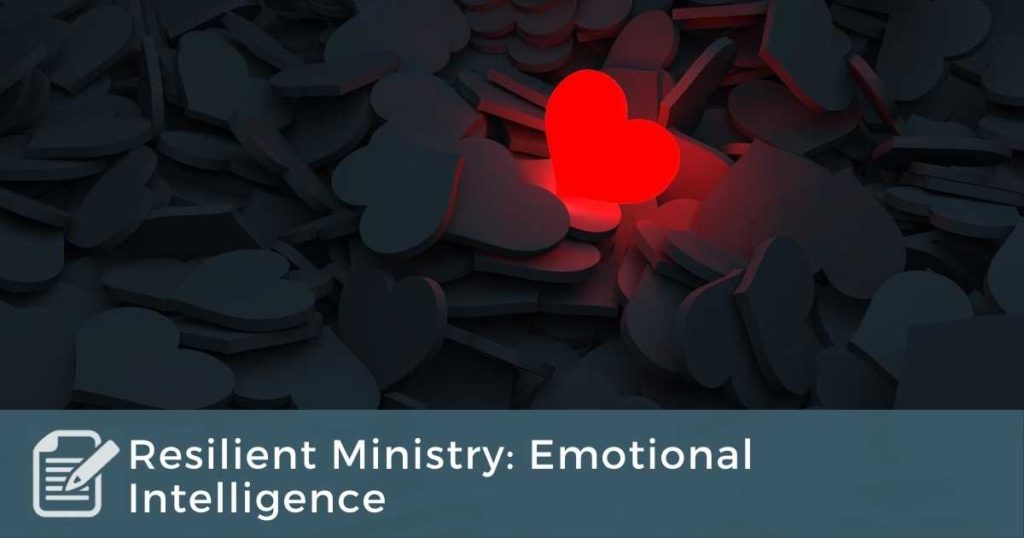The authors of Resilient Ministry share five key themes for ministry vitality, the third of which includes emotional intelligence. As my friend and fellow faculty member at Western Seminary Norm Thiesen says, emotional intelligence is the single biggest determining factor for the long-term success of a pastor. Norm should know, since he’s a psychologist as well as a pastor. My experience coaching ministry leaders concurs with Norm’s experience. Emotional intelligence isn’t the only factor, but it sure is important. As emotional intelligence pioneer Daniel Goleman writes, having an above-average IQ (about 115) opens a lot of doors, but once your through those doors, emotional intelligence is the better predictor: “In a high-IQ job pool, soft skills like discipline, drive and empathy mark those who emerge as outstanding.”
So what do we mean by emotional intelligence? The authors describe emotional intelligence (or “EQ”) as recognizing your own emotions, managing your own emotions, recognizing the emotions of others, and responding to the emotions of others. So there is EQ-self and EQ-others. In their long-term study of pastors, the authors of Resilient Ministry found many pastors to be sorely lacking in EQ-self, EQ-others, or both. Pastors described being in a constant fog as to what they were feeling and lacking much awareness of how their emotions were impacting others.
The authors described four specific problems pastors face that are related to emotional intelligence:
· People pleasing – the willingness to deny one’s own feelings, priorities, values or convictions in order to try to make others happy.
· Emotion faking – Denying one’s feelings and putting on the “pastoral persona.”
· Lack of reflection – because of the busyness of their schedule and lack of self-care, pastors lacked the time or commitment to reflect and process what they were thinking and feeling.
· Conflict avoidance – the pastors’ common tendency to avoid conflict at all costs naturally resulted in a failure to face and address emotions.
The good news is that your EQ can be improved. One’s emotional intelligence is not a matter of nature so much as nurture. Family of origin plays a major role in shaping a person’s EQ, but these abilities can also be developed. As EQ pioneer Daniel Goleman writes, Emotional intelligence is not fixed genetically, nor does it develop only in early childhood…. [It] seems to be largely learned, and it
continues to develop as we go through life and learn from our experiences – our competencies in it can keep growing.” (106)
Improving EQ not only makes a pastor a better leader and more effective minister, it also supports the pastor’s overall health and well-being. So how does one improve EQ? Here are five ways (taken from the book and from my own experience):
· Slow down. When you’re too busy, you focus more on the external world than the internal world and miss the important stuff going on
inwardly. Taking breaks will allow you to decompress, reflect, and notice what’s going on inside. Breaks throughout the day, daylong breaks, and regular retreats prove crucial for staying emotionally tuned in and tuned up. Journaling and prayer allow you to process what’s inside rather than being continually distracted with the external world.
· Educate yourself. When you study and understand the reality and importance of emotions and EQ, you will begin to notice your own emotions with more ease. A great place to start is Daniel Goleman’s classic book Emotional Intelligence: Why It Can Matter More Than IQ.
· Make an assessment. There are several instruments that can help you assess your own emotional intelligence. You can also ask those closest to you for feedback. Ask them, “How well do I appear to manage my emotions so that I express them in healthy and helpful ways
– neither holding them in nor spilling them out?” And ask yourself, “How often do I get emotionally hijacked?” “How easily can I
name what I am feeling?” “When did I last notice the emotional state of another?”
· Work on listening. Active listening – being able to hear and understand what others are actually saying, without jumping to assumptions or conclusions is an absolute necessity. When others are sharing, too many of us try to connect the dots quickly in order to move from “not knowing” to “knowing” as soon as possible. The problem is that we connect the dots the wrong way and create an inaccurate picture of what the other person is saying. When we listen in order to truly understand, we go up several EQ points.
· Give up control. Or more accurately, recognize that you are not in control and should not be in control of situations, and you do have control over self. Much of our emotional distance and emotional destruction flows from our attempts to control other people and situations – to try and get our way. When we don’t, we fume, fuss, shut down, shut up, or otherwise seek to regain control over the situation. Our emotional intelligence is retarded by strategies to keep or regain control. Prayerfully recognizing the legitimate focus of our influence can help boost our emotional intelligence.
So what about you? Are you closer to being an emotional savant or emotional idiot? If you could improve one aspect of your emotional intelligence, what would it be? What about those around you – who is one person you wish were more emotionally intelligent? What does his or her behavior teach you about emotional intelligence?



